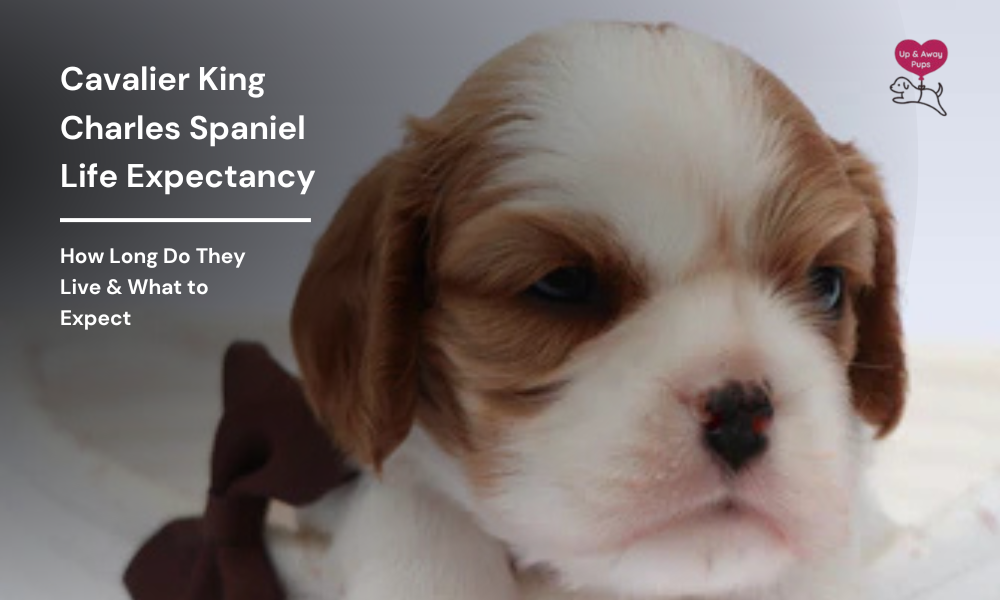Cavalier King Charles Spaniel Life Expectancy: How Long Do They Live & What to Expect
Cavalier King Charles Spaniels typically live 9 to 14 years, with their lifespan influenced by genetics, care, and health conditions. This blog explores common health concerns such as Mitral Valve Disease, Syringomyelia, ear infections, and obesity, along with early warning signs. You’ll also find practical tips for improving your Cavalier’s quality of life, from diet and exercise to regular vet checkups and responsible breeding. Whether you already own a Cavalier or are considering one, this guide helps you support their health and happiness at every stage.
There is something quite extraordinary about the Cavalier King Charles Spaniel that is difficult to put into words. From their soft eyes to their silky coat, they’ve mastered the art of being lovable. One really has to spend some time to truly know the charm of these dogs. But if you’re thinking about bringing one into your home or already share your life with one, it’s natural to wonder: how long do King Charles Spaniels live?
Let’s take a closer look at the Cavalier King Charles Spaniel's life expectancy, what affects it, and what you can do to help your pup live a healthier, longer life.
Average Lifespan of a Cavalier King Charles Spaniel
On average, the Cavalier King Charles Spaniel's lifespan ranges from 9 to 14 years. Most Cavaliers fall somewhere in the middle, living around 10 to 12 years with proper care. Some may pass sooner due to health issues, while others happily reach their teenage years.
If we compare them to the smaller breeds, which often tend to live beyond 15 years, their lifespans may seem shorter. However, this is primarily due to issues inherited or influenced by lifestyle choices.
Common Health Issues That Affect Longevity
Let’s explore some common health conditions in Cavaliers that can impact their lifespan—and how awareness can help improve their quality of life.
❤️Mitral Valve Disease (MVD)
MVD is the biggest concern when it comes to the health of the Cavalier King Charles Spaniel. It is a heart condition that affects the mitral valve and leads to congestive heart failure over time. It is, unfortunately, extremely common in Cavaliers, often appearing as early as five years old.
🧠Syringomyelia (SM)
This is a neurological condition that affects the spinal cord, causing pain and mobility issues, which are particularly heartbreaking to see. They begin subtly and worsen with age.
👂Ear Infections
Those adorable floppy ears make Cavaliers prone to chronic ear infections. Now, ear infections aren’t life-threatening but left untreated, these infections can affect overall well-being and quality of life.
⚖️Obesity
Now, chonky dogs may look cute, but that extra weight puts a ton of stress on the heart, joints, and spine. We understand it is easy to overfeed dogs, especially when they look at you with those puppy dog eyes, but one must stay disciplined. Otherwise, these issues can compound other health issues and result in shortening the lifespan of your pup.
How to Help Your Cavalier Live a Longer, Healthier Life
You can’t control your dog’s genetics, but there’s still a lot you can do.
• Buy from a responsible breeder: Health starts with breeding. A reputable breeder screens for heart and neurological conditions, improving the odds your pup will live a longer, healthier life. Ask for health clearances, especially for MVD and SM.
• Keep regular vet check-ups: Early detection makes a big difference. Annual (or even semi-annual) wellness checks help spot issues before they get serious. Bloodwork, heart exams, and dental evaluations all matter.
• Watch their weight: Obesity sneaks up fast in Cavaliers. Measure their food, limit treats, and make daily exercise a priority. Even a 20-minute walk or light play indoors goes a long way.
• Dental hygiene matters: Bad teeth can lead to bad hearts. Brush their teeth regularly and consider dental cleanings when needed.
• Pay attention to behavior: Is your Cavalier suddenly less active? Head tilting, yelping, or reluctance to be touched near the neck could point to SM. Coughing or fatigue might indicate MVD. Don’t brush these off.
What to Expect as Your Cavalier Ages
It is when Cavaliers reach the age of 7 to 8 that they start to show signs of aging. Tell-tale signs tend to include slower movement speed, ta endency to nap (even more), and a grayer muzzle. That’s normal, so that by itself isn’t a sign of worry. However, if you notice them in pain, coughing persistency or any sudden changes in appetite or mood; red flags should go up.
Senior pups need to visit the vet more often and have a special diet. They might not chase after toys like they used to, but they’ll be just as eager to curl up next to you.
Many owners find these later years especially rewarding. The bond grows deeper, the energy might mellow, but the affection only gets stronger.
Final Thoughts
So, how long do King Charles Spaniels live? The answer depends on genetics, care, and a little bit of luck. But while 10 to 12 years might not sound like a lot on paper, they’re often some of the most affectionate, loyal years you’ll ever experience with a dog.
Cavaliers are gentle souls. They love deeply, follow you everywhere, and ask for very little in return. With the right care, they’ll give you a lifetime of memories — and maybe even a few more years than expected.
If you’re lucky enough to share your life with one, every day counts. So make it a good one.
FAQs
How Can I Tell If My Cavalier Has Mitral Valve Disease Early?
Coughing after activity, a decrease in stamina, or labored breathing can be early signs. Your vet can detect MVD through a stethoscope or echocardiogram, often before symptoms are obvious.
Is Syringomyelia Curable in Cavaliers?
There’s no cure, but it can be managed. Treatment options include pain medications, corticosteroids, or in severe cases, surgery. Early intervention offers the best chance for comfort and mobility.
Do Male or Female Cavaliers Live Longer?
There isn’t a significant difference in lifespan between male and female Cavaliers. Health history and overall care play a much larger role than gender.
More About the Charming Cavalier King Charles Spaniel
Looking to learn more about this affectionate and elegant breed? Dive into our other blog posts to explore detailed insights, fun facts, care tips, and heartwarming stories about the Cavalier King Charles Spaniel
- 🔗 Guide to Managing a Fat Cavalier King Charles Spaniel: Is Your Cavalier Overweight?
- 🔗 The History of the Cavalier King Charles Spaniel: From Royalty to Beloved Pet
- 🔗 Do Cavalier King Charles Spaniels Shed?
- 🔗 Cavalier King Charles Spaniel Price: How Much Does the Breed Cost?
Your Perfect Cavalier Companion Is Waiting
Our Cavalier King Charles Spaniel puppies are raised with love and care. Find the one that's meant for you today.
Browse Available Cavalier Puppies

